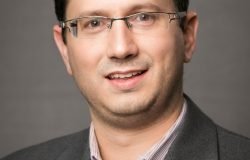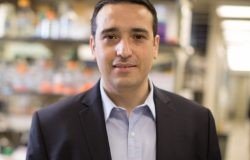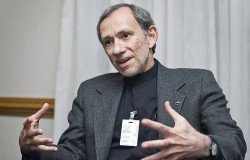Petros Grivas, M.D. Ph.D., is a board-certified medical oncologist with expertise and experience in treating genitourinary (GU) cancers. He is the Clinical Director of the Genitourinary Cancers Program at the University of Washington and Associate Professor in the Dept. of Medicine, Division of Oncology. He is also an Associate Member at the Fred Hutchinson Cancer Research Center (Seattle, WA). His office and clinic is at the Seattle Cancer Care Alliance; he also has clinic at the University of Washington Medical Center.
Dr. Grivas completed his training at the University of Patras Medical School and received his M.D. degree in 2005; he then pursued Ph.D. in Medical Oncology under the mentorship of key academic faculty and defended his thesis successfully in late 2008. He completed Residency in Internal Medicine at Hahnemann University Hospital/Drexel University College of Medicine (Philadelphia, USA) in 2010. He then completed Fellowship in Hematology/Oncology at the University of Michigan (Ann Arbor, USA) in 2013. He stayed there as Clinical Lecturer for another year before he was recruited as Assistant Professor at the Cleveland Clinic (Cleveland, USA), where he was leading the bladder/urothelial cancer program, pursuing clinical and translational research, teaching trainees, pursing outreach, and seeing patients with GU cancers.
He has had main role in clinical trials that led to the FDA approval of new drugs for bladder/urothelial cancer, and is considered a key opinion thought leader and international expert, giving lectures in several countries, educating oncologists, other healthcare providers and trainees, leading innovative clinical trials, reviewing grant proposals and manuscripts for various agencies and journals, and publishing novel and important research. He is dedicated to efficient, personalized and outstanding patient care and believes in optimal patient-physician relationship as well as leadership and community outreach.
Twitter: @PGrivasMDPhD e-mail:
Interview
Dr. Grivas, congratulations on your numerous papers (approaching a hundred soon while you are only 36 years old). Could you tell us about your research and vision?
Thank you for your kind words. It is all about knowing the “why” you choose to pursue something in life, “why” you embark on this journey? For me, it was always about the inherent interest to be of help to other people, this defines meaning and purpose in my life. After you realize the “why”, you have to figure out the “how” and “what” in order to achieve the “why”. Based on this “inquisition”, my research is focused in two main directions:
- To help develop new therapies in the management of bladder/urothelial cancer, via translating novel concepts and ideas from the lab to the clinic, and, also, learning from the interrogation of human tumor biology (“bench to bedside” approach). In that regard, we had the honor and opportunity to participate in large clinical trials that led to the regulatory approval of immune checkpoint inhibitors in advanced urothelial cancer. This was a huge ‘milestone” considering that there had been no major progress in the management of this cancer for more than two decades, therefore it was a huge “unmet” need that had to be addressed. Advanced urothelial cancer is considered a “fatal and incurable” disease. The new treatment agents could result in “rapid and deep” responses in a subset of patients with major clinical benefit; however, many patients still may not respond to these therapies, underlying the urgency to identify additional safe and effective therapeutics for this very challenging disease. Moreover, we are working hard to help identify putative biomarkers that can predict response to those agents and thus help with patient selection. We are also working on additional innovative therapies, either as combination or sequential approaches in order to “move the field” forward, prolong survival and increase quality of life. We are now evaluating therapeutic agents not only in advanced but also in earlier stages of this cancer with very promising clinical trials and various translational correlative studies.
- To contribute to the realization of “individualized/personalized” medicine via thorough understanding of the unique features of host-tumor interactions for each patient. With the advent of next-generation sequencing we can incorporate molecular testing in the management of a patient’s cancer in order to discover putative therapeutic targets and putative predictive and/or prognostic biomarkers. There is also high interest to better understand the immune landscape of the “host” (the patient) and how it may interact with tumor development and progression. We are also conducting innovative clinical trials focusing on specific genomic alterations that can be targeted with specific compounds within a tumor type (“umbrella trials”) or across tumor types (“basket” trials, e.g. NCI-MATCH). There is a plethora of genomic alterations identified and we need to have adequate bioinformatics support to analyze the emerging data and, also, develop the platforms to share such data in databases and learn from each other. This concept of “big data” sharing and utilization is becoming a priority in the international level with multiple stakeholders. Next generation sequencing can be pursued in tumor tissue and cell-free circulating tumor DNA, and we have published in both aspects. At the same time, there is attention to germline mutations identified and how genetic counseling and testing can help in prevention, screening and early detection of cancers at early stage in order to implement preventative approaches and curative intent therapies if and when possible.
What do you find the most exciting and the most challenging thing about your research?
The plethora and speed of new information and findings is fascinating; we have the chance to pursue several clinical and translational projects leading to interesting results. It sounds like an “endless pursuit” but it is really rewarding and one answer to a scientific question leads to many more questions. This raises the opportunity to learn more, disseminate what we learn with the scientific community via publications, as well as oral and poster presentations. At the same time, the challenges include “priority” and “focus”. In the current environment, it is extremely hard to secure funding for translational research, while the system often requires asking a specific fundamental basic question. In the complex and dynamic “microenvironment” of a cancer it is important to also keep the “big picture” in mind and place the data derived from a study in the proper context. This balance of focused vs. comprehensive approach is not necessarily a dichotomy but poses a nice challenge, which can be characterized as an opportunity at the same time.
How difficult was your journey to Associate Professor and Director of this Program?
Every career transition in the academic ladder has numerous challenges and different requirements. Every step is important and requires very hard work, diligence, persistence, perseverance, passion and “grit” as Angela Duckworth names it. It is the “fire and motivation” that keeps all of us going in this continuous “journey”. A colleague of mine told me once that our career is like a “very fast treadmill from which you cannot come off unless you fall”; we try to maintain a fast but steady pace keeping in mind the “why”, purpose and meaning! It is important to understand the metrics of “success” at every position you have and try to balance all the increasing responsibilities, e.g. clinical, research, mentoring and teaching, administration and servant leadership, community outreach, advocacy, policy, etc. Building a good TEAM, recruiting and managing personnel, keeping balanced approach, avoiding biases and maintaining principles are critical steps. A TEAM can manage more than an individual, and how to function as a team requires conscientious efforts and mentality.
What is your advice to trainees and Junior Faculty?
It is critical to find an important priority and a focused, relevant research theme that will keep them excited. Developing a thorough understanding of the broader scientific environment, and reading continuously is important for generating new questions, but also important to write and publish. Great if they apply for funding and learn from every attempt. Mentorship is key, so finding the right mentoring team is critical, as well as starting early their academic pursuits (it is never “too early”). They should ask many questions, be eager to learn from mistakes and translate them into meaningful actions. It is very important to have patience, perseverance, persistence and work very hard; nothing can substitute for hard work. They should not forget to take care of themselves, eat healthy, exercise regularly, sleep adequately, maintain balance and perspective in life, it is hard to do but very meaningful to try. Networking can be a life “changer”; you never know what doors may open; don’t be shy, go introduce yourself and maintain a new professional relationship, life and academia are full of interesting surprises.
- How do you view HBA-USA efforts to promote interactions between scientists in Greece and the USA and how would you like to see the HBA evolving in the next years?
I would take this opportunity to THANK and congratulate all of you for taking the time and offering your services to HBA-USA. Your great efforts to promote interactions with our colleagues and trainees in Greece should be further supported by all of us. There is research productivity in Greece that should be acknowledged, maintained and grow more; this can further stimulate the education and the economy in the country. It can also support the research we do in the USA via fruitful collaborations and “cross-fertilization”, we can learn from each other. It also sets the stage for observer-ships, electives, training courses, workshops, lectures, meetings, congresses, conferences, etc. that can support trainees as well mutual interactions and exchange of ideas. I have no doubt that HBA-USA can expand those great initiatives and help generate opportunities for educational, research, clinical and entrepreneurial interactions; “sky is not the limit”, we should work more together as a TEAM.
With which character from Greek ancient literature would you compare cancer and why?
Very hard question. If you recall the ancient battle between Greeks and Persians, there was a traitor called “Efialtis=Εφιάλτηs”, who betrayed his own people. In a similar “poetic” fashion, a cancer cell is derived from its own body and can cause huge harm in the body, which is hard to address. It is a just “a parallel philosophic concept” that may illustrate how hard is to treat cancer, which may be regarded as a «mistaken evolutionary process derived from someone’s own cells”. However, if we understand “why” this happens we may be able to identify features early and try to prevent this “nightmare (translation of “efialtis”)” of our societies worldwide.
Tell me one of your favorite poems and why?
I was recently attending a very inspiring and educational lecture by our Division Chief and President of our Institution; I was thrilled to see her last slide about the importance of the “journey” in life and career, nicely referenced by the poem “Ithaca” by Cavafy. This is a lesson for life; we all should aim for our destination, our “why”, our mission; however, what really matters is the “journey, the trip, the route” itself. We need to learn from each step and enjoy it, stay focused and avoid the “sirens’, don’t be afraid of the hurdles, and importantly don’t project our own fears in the landscape and to others. We should keep a “clean mind and calm soul” as the Greek writer Alexandros Delmouzos eluded to; this requires a mentality of continuous improvement and avoidance of staying complacent.
What helps you relax?
Reading books, etc. philosophy and poetry, running and playing sports, watching a nice movie, discussing and essentially communicating with other people, walking on the beach, enjoying a sunset, having a nice meal, dancing (rare occasion of truly “liberating” myself) are examples; am also interested to learn more about meditation and yoga; have not pursued those as much.
What is something that most people don’t know about you?
When I was younger, could imitate about 30 voices, e.g. actors, characters of a play, famous people, etc. Also wrote a play and we presented it via a theatrical performance with my schoolmates at the high school theatre; wonderful memories of the adolescence era.
What famous scientist do you look up to?
There are so many, it is not possible to pursue this selection considering the plethora of so impactful scientists in the world. Being Greek, we are all proud of George Papanikolaou’s “journey”, perseverance and meaningful impact on the society via painstaking research. Of course, there are many others and we are all grateful to all of them, they shine light always!
Tell me one of your favorite movies?
Another very hard question. One of the earliest movies I recall is “Dead poets society” from 1989; strong memories, lessons and emotions; there are numerous other movies as well.
If you seek some inspiration, where do you look for it?
Many possible sources, would probably say from people; always looking into people to learn more from, exchange ideas, get inspiration and feedback; nature and history can also teach us a lot. In my daily life the most influential and inspiring factor is my patients and their families; it is the ‘why” that am working days and nights for, they make me a better person and help me realize that strength can sometimes be hidden inside us; they show how to enjoy life but know the limits, maintain hope but also be realistic, seek treatment and know when is time to transition; hard to describe the thoughts and emotions that are generated every single day..




